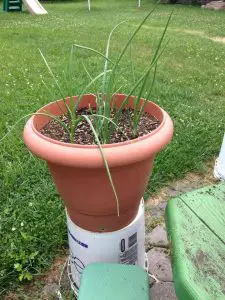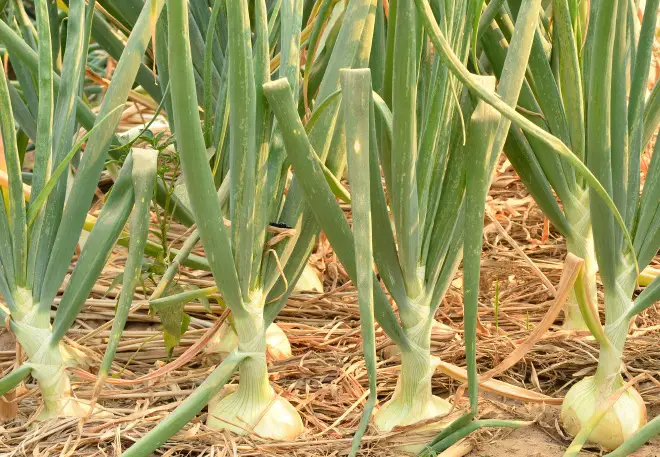Onions are a great crop for your home vegetable garden. You have plenty of choices, and they are very easy to grow directly from seed. Onions are also an excellent candidate to grow in containers, as some varieties such as the bunching types, take up very little space.
It’s now August, and most onion varieties need a minimum of 60 days to mature. That will take you to the end of September, beginning of October. In some areas, that may be past the frost date. That is ok. Throw a cold frame over your onions, some row covers or a garden cloche and you will be able to protect your onions. Some varieties may not even need that.
Tips for starting your fall onions
PLANTING DEPTH
I always describe onion seeds as “miniature pieces of coal.” At least that is what onion seeds look like to me anyway. With that said, they are a decent sized seed, needing only to be planted at about a ½” deep. If you are using containers with a peat based mix, you can go a bit deeper. That type of soil is very loose and friable and will not present any germination issues.
SEED SPACING
When direct sowing your seeds into your garden, which is what you can do right now, the spacing will depend on the variety. If you are planting a bunching variety, 2” to 4” is all you need. If you are going with a variety that will grow a bit larger, such as a red burgundy or yellow Spanish, I recommend 6” to 8”.
GERMINATION
Under optimal conditions, perfect weather, excellent soil, and so on, I have experienced onion seeds germinating in as little as 5 days. That is not the norm though. Ten to fifteen days to germination is more likely and more common. Mix in plenty of compost and hydrate your seeds first to help increase germination rates.
 DAYS TO MATURITY
DAYS TO MATURITY
As noted earlier your onions will need 60 days. That does not mean, if you harvest on day 59, they are inedible, it simply means, to reach full growth, 60 is the average optimal time frame. You may need more time, or you may, with good soil and fertilization, get your onions sooner.
LOCATION
When picking a spot to grow your onions, choose a location that receives full sun. Onions can grow in partially shaded areas; however you are up against the Mother Nature clock here. Full sun will do wonders for growing onions if you have the space available to accommodate.
DRAINAGE
Onions are a root crop, so good drainage is very important. Too much water sitting around the roots can cause your onions to rot. If your soil is too dense i.e. has too much clay etc., mix in some peat to loosen it up, or add in loads of compost. This will help water drain away much better without leaving the soil area too dry.
CARE
As with any of your vegetable plants, keep the weeds away so your onions are not in competition for the soil’s nutrients. Weeds normally win. Be sure to feed weekly with a good fertilizer, or add in compost around the base of your plants. A light daily watering is all you need.
I don’t have to go through all of the culinary uses for onions as they are used in a lot of various recipes. Just know that not only do they add flavor to your favorites dishes, they contain calcium, iron and a good amount of vitamins, A, B1, B2 and C.
About the Author
Mike Podlesny is the author of the book Vegetable Gardening for the Average Person as well as the creator of the Seeds of the Month Club where members receive non gmo, heirloom variety seeds every month. You can listen to Mike each week on the Vegetable Gardening Podcast where he interviews gardening industry experts.



2 comments